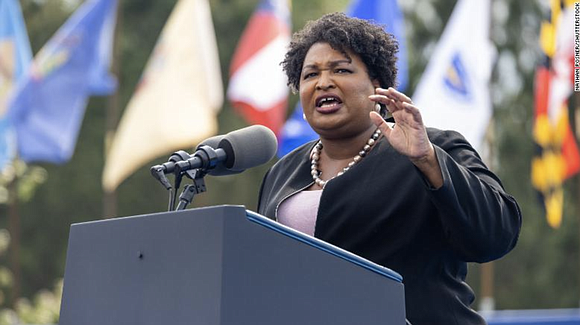Stacey Abrams: 'Callous' Leadership in These States Has Left Millions of Americans Without Health Coverage
Style Magazine Newswire | 9/24/2021, 3:07 p.m.
Opinion by Stacey Abrams for CNN Business Perspectives
Throughout the course of the pandemic, we have witnessed inequities ripple across our society, particularly along racial and socioeconomic lines. Most tellingly, this imbalance affects frontline workers — many of whom are people of color — who put their lives and health on the line to keep our communities functioning while risking their families' well-being.
Now, as Congress begins debating President Biden's plan to Build Back Better, we have the opportunity to help millions of these workers by permanently closing the Medicaid coverage gap, which would help reduce racial disparities in health care. While lawmakers are working in good faith to solve this crisis, our focus must be on whether they will opt for a temporary fix or for a more comprehensive, permanent solution that guarantees Medicaid coverage for Americans living in states that refuse to expand it.
The House Committee on Energy and Commerce passed one such potential solution last week. Under that proposal, people in the coverage gap would be eligible for federal subsidies that would cover the cost of a private health care plan on the Affordable Care Act's exchanges before transitioning to a federal Medicaid fallback policy that would go into effect in 2025.
Currently, the Affordable Care Act's (ACA) Medicaid expansion guarantees quality, affordable health coverage for nearly 15 million Americans in 38 states and the District of Columbia. Recognizing the proven financial and health benefits and underscoring its broad popularity, this extension of health coverage has been championed by Republican and Democratic governors alike and won through voter referendums at the ballot box in Idaho, Maine, Missouri, Nebraska, Oklahoma and Utah.
More than a decade after the ACA's passage, however, 12 states stubbornly refuse to implement the full expansion — intentionally denying access to affordable health care coverage to nearly 2.2 million low-income Americans. Leaders in these states argue that expansion is too costly, ignoring the reimbursements the federal government provides for expanding Medicaid. Eight of these non-expansion states are located in the South. And 60% of people who fall in the coverage gap are people of color, despite people of color making up just 41% of the nonelderly adult population in non-expansion states. That is why leaders of the Congressional Black Caucus and Congressional Hispanic Caucus have called permanently closing the Medicaid coverage gap "one of the single most important steps we can take to reduce racial health inequities across the United States."
Under the American Rescue Plan passed by Congress earlier this year, these 12 recalcitrant states have been offered incentives to do right by their people and expand Medicaid, but their callous leadership, including that of my home state of Georgia, puts politics over health. Even as our families and our providers struggle through a persisting pandemic and vitally needed hospitals close, they refuse to act. Sadly, it seems they fear backlash from their political parties more than they fear the consequences of non-expansion.
This comes at a cost not just to health care providers, but also to low-income people in the coverage gap who end up struggling with higher medical debt. Taxpayers and medical facilities, especially rural hospitals, are left footing the bill for uncompensated care.
Well beyond the financial consequences, the coverage gap has led to thousands fewer early-stage cancer diagnoses and the loss of tens of thousands of lives each year. Due to systemic racism, communities of color have just a small fraction of the wealth held by White Americans, and they suffer from higher rates of chronic diseases, like diabetes and hypertension. The coverage gap only exacerbates these longstanding disparities in health and wealth.
Throughout my legislative career, and now through my work with the Southern Economic Advancement Project, I have fought for Medicaid expansion in the South, a region with the greatest health challenges and the deepest refusal among elected leaders to meet the needs of our people. We have provided the research and partnered with advocates throughout the South to amplify their calls to action.
As the daughter of two pastors, my faith guides me to believe that policymakers' obligations should center on those who are the most vulnerable among us — the poor, the sick, the disabled. By permanently and comprehensively closing the coverage gap, Congress can show that they truly do value the contributions that home health workers, sanitation workers, cashiers, early educators, food service employees, retail and construction workers and others make to keep our society operating day in and day out, pandemic or no pandemic.
One person without adequate health care coverage is one too many. Nearly 2.2 million is a disgrace. We need Congress to act to finally extend coverage to our fellow Americans whose partisan state lawmakers have denied them justice and equity for too long.




